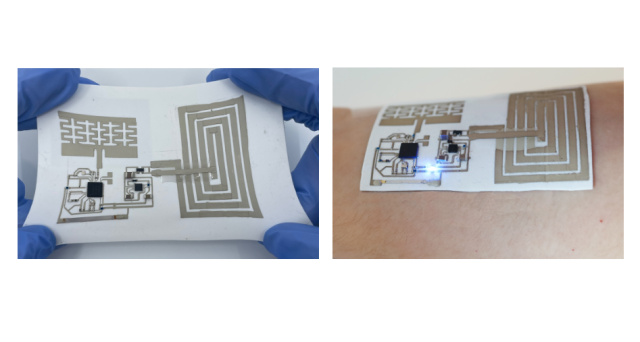Researchers develop stretchable electronic skin with telecommunication capabilities for first time

This combination of photos shows a strain-invariant stretchable wireless device newly developed by a joint Korean and U.S. research team. Courtesy of the Ministry of Science and ICT
SEOUL, May 23 (AJU PRESS) – Korean and U.S. researchers have developed a highly elastic electronic material that mimics the movements of skin and maintains its radio frequency properties even when stretched, marking a significant advancement in the development of wearable devices.
Electronic skin with sensing and telecommunication capabilities is recognized as the next-generation wearable device, ideal for tracking the body signals of the wearer. However, current devices like skin patches or films often lose their telecommunication ability when the antenna changes shape due to skin movement, which shifts the resonance frequency.
In a paper published in Nature, a global peer-reviewed scientific journal, on Thursday, a research team led by Professor Jung Yei-hwan from Hanyang University’s Department of Electronics Engineering reported the development of an elastic electronic skin device with telecommunication capabilities using nanotechnology and a special stretchable material.
The team, which also includes researchers from Rice University in the United States, described their finding as “an unprecedented technology that has not yet been reported in the academic sector.”
The researchers created a circuit board by mixing ceramic nanoparticles with elastic rubber. Using this special circuit, they developed an electronic skin device that maintains its telecommunication abilities even when stretched. The stretchable skin can communicate with other devices over a distance of more than 90 meters (295 feet).
According to the Ministry of Science and ICT, the researchers were able to accurately detect body signals such as brain waves, body movements, skin temperatures, and muscle signals.
“The recently developed stretchable wearable wireless communication technology can be applied to various systems requiring wireless functionality,” Professor Jang said in the ministry’s press release. “We have also begun developing stretchable wireless wearable devices equipped with next-generation 6G mobile communication capabilities.”
This technological breakthrough has significant potential in the field of wearables, as the stretchable electronic skin device can be used in various situations, such as sports, emergencies, and other scenarios involving dynamic body movement. In such conditions, the newly developed device can maintain its telecommunication ability to stably communicate with other devices, such as heart rate monitoring devices.
Jang said that the research team plans to apply the nanotechnology to high-frequency coils used in magnetic resonance imaging devices. “Because the sizes of people’s heads are all different, we think that it would be a great research project in the practical field if we can develop an elastic and comfortable device capable of maintaining the magnetic resonance frequency,” he said.




